BIOGRAPHY
JOSEPH EGAN: MOVIE BUFF
A friend once called me “a walking film encyclopedia” and he wasn’t far off the mark. Since, as everyone who knows me is aware, movies are not only a big part of my life they are also a big part of who I am. In fact, they are who I am.
Case in point: my videos—and I have thousands—are shelved in chronological order. Thus, I can point to this or that spot and indicate important periods of my life. Pointing to one section I can pinpoint where, when I was very young, I began going to the movies with my two older brothers. Another spot is where I started attending movies by myself and was able to see the movies that I wanted to see and not the ones my brothers dragged me to. Over here is when I first took a train from Westchester into Manhattan to attend a movie at one of the first run movie palaces that still lined Broadway in the Times Square area. This is the movie I went to on my first date. These are the movies I went to see with my fiancé’ and these, the movies we saw together after we were married. It goes on and on right up until the present. In fact, one of my very first memories goes back to the summer of 1954 when my mother took me to the fourth re-release of GONE WITH THE WIND playing second run at a local Loew’s theater in Rockaway, New York where, when I was a child, the family spent summers at the shore
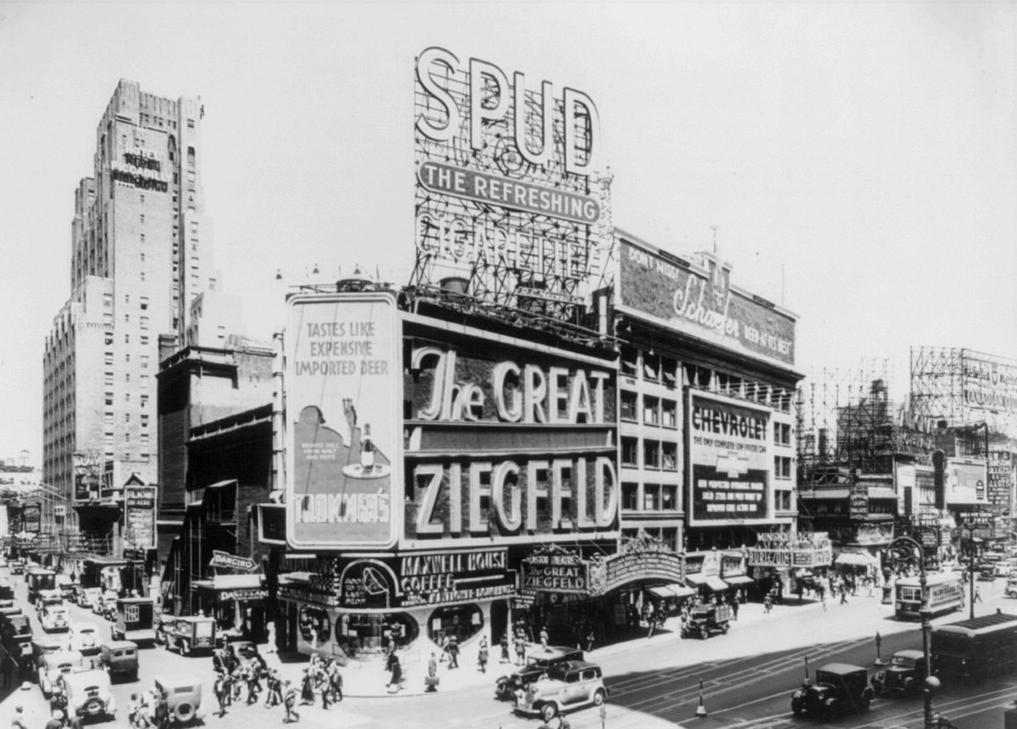
"THE GREAT ZIEGFELD" BEFORE IT MADE IT TO THE LATE SHOW.
As far back as memory serves, movies were always a part of my life. As odd as this may come across, my first linear memory—not the scattered memories of early childhood, but the linear memory that follows a straight course until the present—began in 1956 when on—I think—a Saturday night my brothers and I watched THE GREAT ZIEGFELD on The Late Show broadcast by New York’s Channel 2. That memory is as vivid as if it happened yesterday.
To understand the why of this requires a look at my early life. I had never contemplated writing about any of this until a friend asked me in words to the effect, “Why would anyone be so interested in watching movies all the time.” Mind you this is someone who enjoys Charlie Chaplin and an occasional serious movie but would much rather spend her time taking a walk, visiting with family or reading metaphysics and philosophy. What follows is my answer although somewhat elaborated.

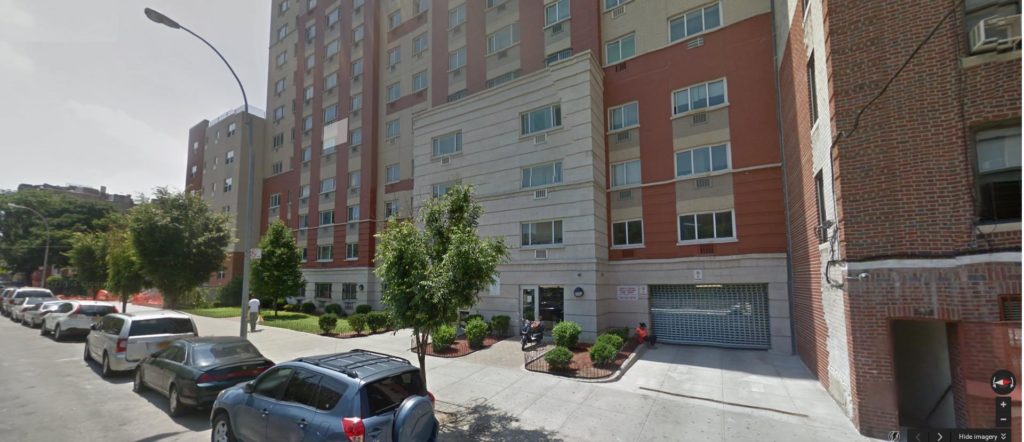
BATHAGE AVENUE THEN AND NOW.
When I was very young my parents didn’t have very much money and at first we lived in a small four room apartment on Bathgate Avenue in the Bronx where I could often hear the sound of gunshots at night. About this I do not exaggerate. It was definitely “ghetto” and an area of New York made famous by the E.L. Doctorow crime novel and the Robert Benton-Dustin Hoffman movie adapted from it. Of note; today almost all those old apartment buildings have been demolished and replaced by brand new residential structures and private homes as well as an occasional recessed commercial building on tree lined sidewalks. For sure, the days of gunshots piercing a nighttime Bathgate Avenue are long gone.
When I lived there, Bathgate was famous for its food markets—meats, produce etc.—which were sold from stands positioned on the street in front of the many stores that lined both sides of the avenue. Operating a fresh fruit stand in front of our building was a huge man in his fifties who everyone called Ruby. Even though I was still a child I can remember him standing behind his stand dressed in a soiled old coat and apron shouting as he argued over prices with customers. Besides his size and loud voice what struck my child’s curiosity and even fear, was that Ruby had several digits missing from his—I think—left hand. Never having seen this sort of thing before it seemed quite strange to me. Whether it was a war wound or the result of an accident I never did discover and at that stage of life I simply didn’t have the courage to ask. I also clearly remember all the bustle and activity that surrounded him and every other seller in what was an extremely busy, loud, noisy humanity filled Avenue. This was life in New York City at its purist and I got my dose pretty early.
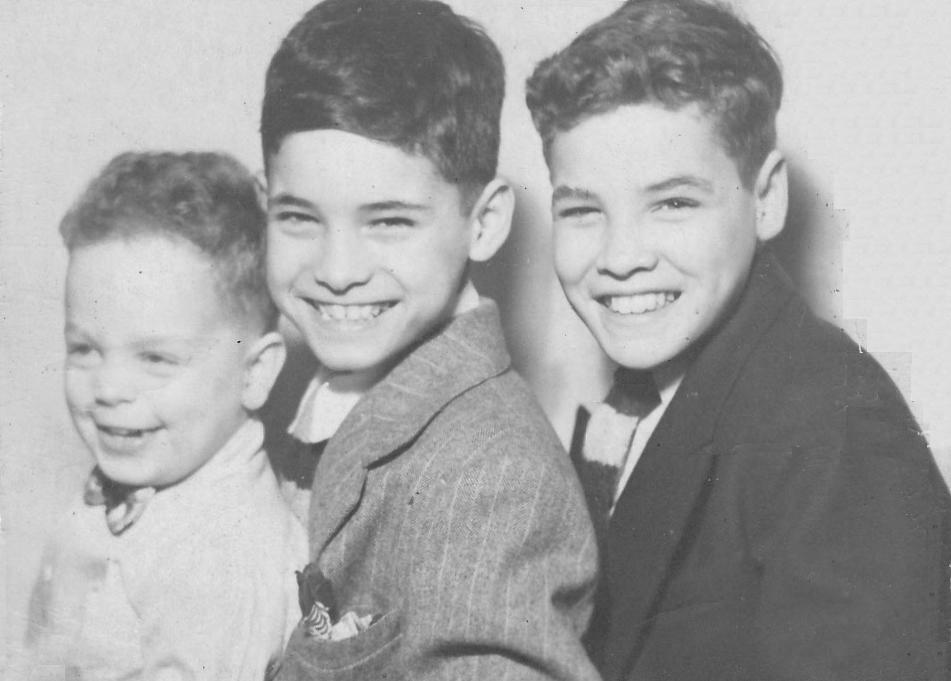
ME AND BY BROTHERS. I'M THE ONE ON THE LEFT WHO RESEMBLES A CHIMP.
My two brothers and myself shared a bedroom off the kitchen where I, the youngest, slept on a day bed and my brothers shared a bunk bed—the oldest on the bottom and my middle brother on top. Our kitchen, as with most homes, was the center of family life. Consequently, when my father was there he dominated the room—in fact, he dominated anyplace he happened to be. My father was what today we call “intense” and with him it was intense to the extreme as his forceful personality filled that kitchen to overflow. This overflow made its way into our adjacent bedroom, literally pulling me into the man’s neurotic world; involving me in whatever he was railing on about until, literally, I didn’t have a sense of my own inner or outer space. It was as if he had gobbled me up. Not only did this rev up a great deal of anxiety on my part since I didn’t know what my father was going to rant on about from one day to the next but, it also nurtured within me a sense of insecurity because to my child’s mind I didn’t feel I had a safe place—emotionally as well as spiritually—where I was protected from these overbearing psychological protrusions.
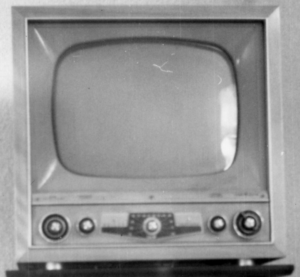
The only escape afforded me was a small 13 inch B&W white TV which sat in our bedroom adjacent the door to the kitchen. From where my bed was positioned I couldn’t avoid seeing my father at the kitchen table discussing—at great volume and great length—whatever was troubling him. As he was a neurotic it was usually about imagined slights, people either betraying him or attempting to undermine his position at work. For me, in that circumstance, my bedroom’s 13 inch B&W TV—which had been the family TV until a 19 inch had replaced it—was both a godsend and an escape from my father’s overbearing emotional and spiritual intrusiveness.
Fortunately this was in the mid-1950s when, due to a steadily declining box office, film companies, in desperate need of cash flow, were leasing their pre 1948 films to local TV stations all over the country. As a result old movies quickly become a mainstay of every TV station in New York City. In those early days because of this there was an unending flow of pre-1948 movies to local TV stations. So, by the time my father was making decent money and we moved to Westchester—my brothers having left to start their lives—I had both my own room and TV. Accordingly, I must have watched at least five movies a day. There was an afternoon movie, the early evening movie, the prime-time movie, the late show and of course the late-late show. And it was pretty much the same for every one of the six TV stations that were broadcast in the New York market meaning that on any given day at least 25 movies were available for viewing.
In addition to movies I also watched TV shows and they were OK but it was the old movies that literally fired up my imagination and garnered my interest and, I believe, saved me spiritually from a home where aesthetics had absolutely no place. In fact, our small Westchester apartment was so bereft of any kind of aesthetic stimulation that as far as art was concerned it was as barren as a desert in mid-summer. Thus, those old movies became my means of escaping both my father’s all consuming ‘over the top’ erratic emotionalism as well as my introduction to a world outside my apartment and my own extremely limited immediate Bathgate Avenue and Westchester experience
In these old movies which I saw on that TV or the few I could afford to watch on a big screen at a local movie theater, everything was beautiful, everyone was pleasant, everyone got along and, for the most part, life was sweet and fair. The good guys always came out ahead and the bad guys received their just rewards. In truth, it was a movie fantasy-land for which Hollywood studios of the 1930s and 40s were famous. Yet, I believe it was exactly that fantasy world which saved me spiritually. For others that escape might have been books. But for me it was movies and those movies were nothing short of wonderful. Many years later I interviewed Captain Kangaroo—Bob Keeshan—of Children’s TV fame and he told me, and he was quite frank about this, that because life is so grim we all need fantasy to get us through our daily lives. With regard to my childhood those words rung quite true.
Later in life because of movies I never needed inebriates to make it through the day because all I need to do to momentarily escape a difficult problem or take a short break from ‘real life’ was watch a movie and lose myself in the world it created. In high school and college I did get high on alcohol and then pot but that wasn't used to cope, it was used to enjoy myself at a party. By my mid 20s I didn't even drink a beer. So, not long ago when I was extremely down about something—which fortunately I can’t remember right now—I put on BREAKING BAD and watching two or three seasons of the show was able to get through a particularly bad time. The following day, head cleared, I was now able to surmount the problems that so troubled me the day before. In short, Mr. Keeshan had hit the nail right on the head.
Moreover, it was movies that ignited my interest in history and a big reason why I began to read extensively when I was old enough to purchase the inexpensive paperbacks then found on racks in drug and candy stores. Of course, the novels that I was reading, for the most part, had been adapted into the movies that I had just enjoyed watching. East Of Eden, The Grapes Of Wrath, Gone With The Wind, Anthony Adverse, even War And Peace And Les Miserables, were all books I read before I turned fourteen. It was movies that opened up a world for me which, otherwise, I would never have known existed. In turn this permitted me to develop an aesthetic that helped teach me to appreciate art and serious music. Regarding music, movies were an invaluable learning tool. Because Hollywood films of the 30s and 40s contained film scores steeped in 19th century musical sensibilities this enabled me to appreciate the music of Beethoven, Brahms, Chopin, Tchaikovsky, Liszt and so many others; many of whose actual compositions I heard for the first time watching a movie.
Therefore, by the time my teens ended I knew Hollywood movies inside-out and while attending university—with a college library at my disposal—I read everything I could about films while week-after-week attended showings of foreign films presented by a college film society. Here I learned about Fellini, Chabrol, Bergman, Antionioni, Truffaut, Kurosawa, Godard and all the international filmmakers whose films hadn’t been available to me on TV or at a local third run movie theater. Film makers that I now learned all about while buried deep in the stacks of that college library reading everything I could about movies.
I can think of no place where I was more content than in the stacks of that college library. There I was free to roam about while at my fingers tips was everything I might want to learn about most anything, film or otherwise. It was intellectual ecstasy. In truth, what I enjoyed most about those stacks was the bound volumes of the New York Times. Going through each volume from 1910 through 1947—47 was the year that the library switched to microfilm—I was able to follow the history of film as it was actually happening. It was a learning experience beyond anything I had encountered before or since. I read everything The Times printed on films while also studying the movie ads and learning how those old films had been marketed. As a result, today I can tell you what films opened at what New York theaters as far back as 95 years ago.
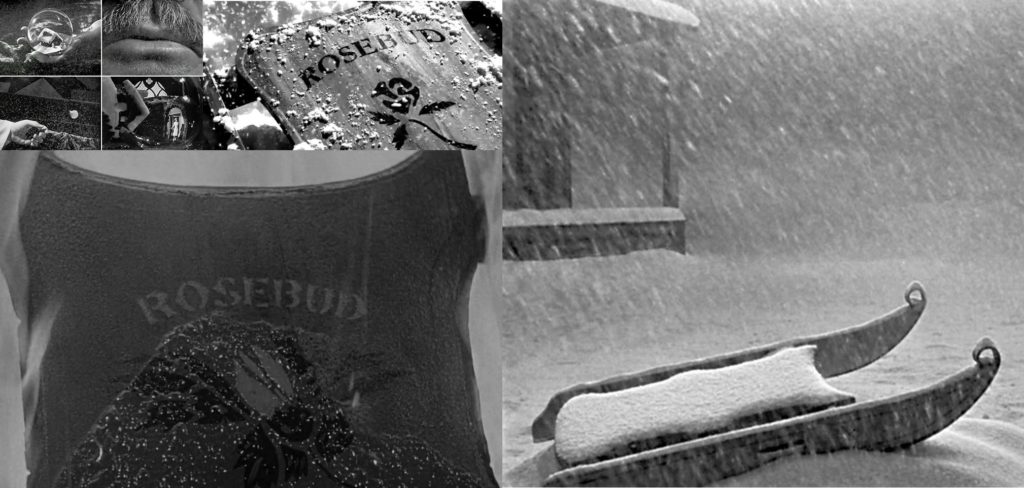
A clear indication of the transformation that college afforded me vise-a-vie movies began at a film society showing at the university. It was my second day as an incoming freshman and while waiting to get into the hall showing the film I overheard two professors discussing CITIZEN KANE. One of them would eventually become my film professor. They were analyzing Rosebud and both agreed that for the dying Kane it demonstrated regression. As I hadn’t yet attended my Psych-101 class I had no idea what regression was. But, hearing these two men putting their thoughts to words in such an informed and, even, elegant manner through a precise use of language, I thought the two nothing short of brilliant. I also concluded that this level of brilliance was something that I could never attain no matter how hard I tried. In fact I was actually depressed about this predicament for a good week or two afterwards.
Flash-forward two or so years and I was now a student of that film professor and, after just a few weeks in his class, whenever he was asked about me he would tell anyone who cared to hear that I knew more about film then he did. By this time I knew what “regression” meant and I couldn’t disagree with him more and often did. We argued—politely of course—with these arguments dominating classroom time while a roomful of bewildered students didn’t have the slightest idea what the two of us were talking about.
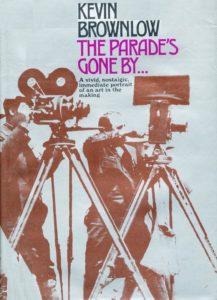
Our fiercest arguments concerned Kevin Brownlow’s The Parade’s Gone By published just a few years earlier and which single handedly created a resurgent interest in silent films. My film professor thought the book a waste of time as it didn’t contain single intellectual idea or concept. In reply, I argued that this wasn’t the point. Brownlow wrote the book in an attempt to bring to life a period of filmmaking that was not only gone but, at the time the book was published, forgotten by everyone except for a few diehard fans or first year film students.
As my professor was as set in his views as I was, I may not have won the arguments but these arguments helped me to prove something to myself. I had finally achieved the brilliance that I so craved during my early days at university. And, I knew this because I knew film and had the background that enabled me to utilize that brilliance. This was another gift that the movies had given me. Truth is that time has proven to me that I’m not so brilliant, if brilliant at all. I was just informed and with that knowledge could forcefully support an opinion. That wasn’t brilliance; it was simply being extremely opinionated which, regarding movies, I still am.
Movies did and still do enrich my life. Now older, a half century away from my father and his spiritual smothering, I no longer see movies as a diversion or as exclusively fantasy. I see them as art, which like theater is a collaborative art, but art just the same. I also know it was, and still is, a business run with few exceptions by hustlers and cooperate bean counters and, thus, a lot of junk was made during Hollywood’s golden age as it is still being made today. Yet, the best of these films are works of great emotional and intellectual power whose resonance has remained with me all my lifetime.
Is a movie an accurate presentation of life; of course not. I used to tell my kids that, as a presentation of life, movies are basically bullshit, Yet, in that bullshit there can be both illumination and a great deal of insight into the fabric of existence that can be truer to life if not in form, then in theme. In short they can enlighten the experience of life to such an extent that a film can enable many to achieve a better appreciation of their lives. If that’s not art, then I don’t know what is.
Unfortunately, my great love for movies has not passed down to my step-children. Like me they enjoy watching films but it is not a passion for them. For them movies are simply a diversion. As adults the boys prefer video games and the girls, reality TV. I once put on RAGING BULL when they all came up from the city for a weekend visit. Their response was like a dagger stuck into my heart. One found it boring and didn’t understand any of it. Two were either too busy talking through it or preferred getting up every ten minutes to prepare snacks while paying little or no attention to the film. The oldest boy did say that he liked the movie but couldn’t understand what all the fuss was about. Hard as it was, I had to finally realize, that ultimately I could never really share this part of my life with them and my particular take on movies was, and would always be, a solitary affair that I could only share with other like-minded film buffs who are few and far between.
For those readers who have gotten this far in my not so brief narrative, some will find this all rather sad if not warped. That is to be expected as my take on movies is not for everyone. But for those who can find their way to this sort of appreciation, they will discover a great joy just as I have. Today, transporting myself back to childhood, I can still remember myself as a little boy sitting in a darkened movie theater looking up at an enormous movie screen caught up in a magical world. While sitting in that theater I felt removed from all the difficulties and problems which were my life outside that darkened theater. In that darkness, even if for a short time that it took a movie to un-spool, I felt safe as I was caught up in the dream world unfolding up on the screen.
I may not see a movie theater the same way today but that is because I am older and see the world through the enlightenment of an adult. But to be sure, a great deal of that enlightenment came about, and developed from my appreciation of movies and for that I am eternally grateful.
JOSEPH EGAN: WRITER
How and why I became a writer is an interesting story—well, maybe not so interesting. It is proof that life works in its own mysterious and often baffling way. Truth be told, most of the time I wondered my way through life with no direction and just sort of fell into things either through luck, or when I needed to eat. That is, except for my writing. That always had my complete dedication, a dedication that never wavered. How strong was this dedication? It should be noted that my father discouraged me from any creative endeavor that I ever attempted. In fact it was more than discouragement. It was blatant disapproval. He made me feel that there was something wrong with it and, so, thanks to dad, I was 35 and in analyses before I could actually sit at a typewriter (we still used them in those days) and not feel guilty It wasn't that my father was a terrible person, he was just ignorant and limited, and for someone with a creative bent, having a father like that and being able to move past that nonsense is not always easy. But, fortunately, or unfortunately depending on your opinion of my work, I did
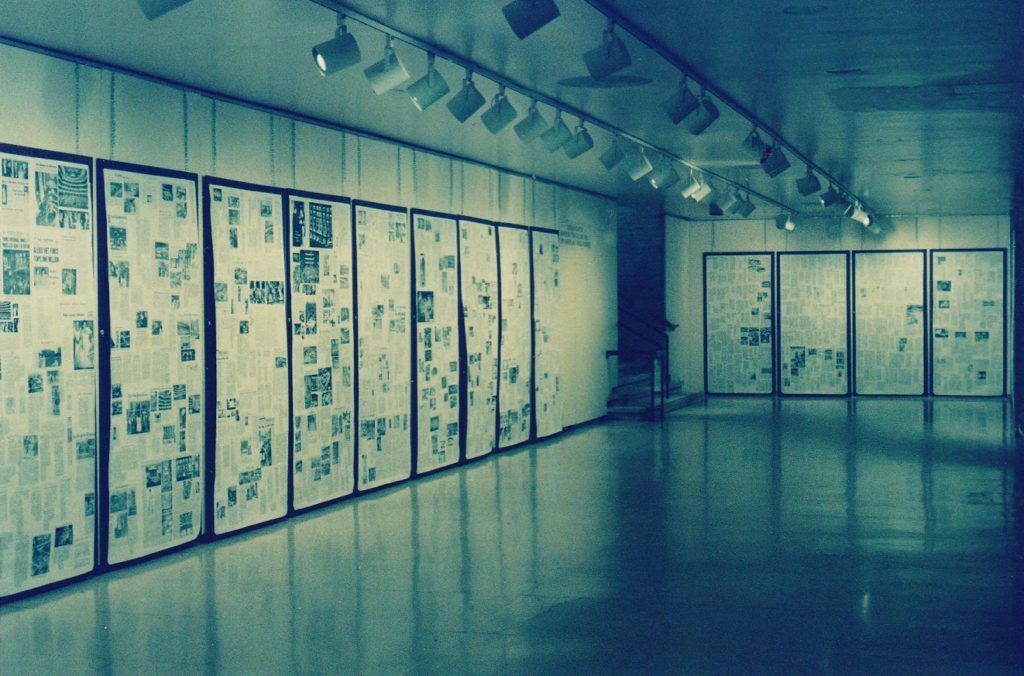
A PARTIAL VIEW OF ONE OF MY LATER COLLAGES EXHIBITED AT LINCOLN CENTER . IT WAS 8' x 100'
While still in college I had been commissioned by various nonacademic departments in the school to create a number of huge 12’x16’ photographic collages for display on campus that would eventually reach sizes of 12’x32’. Basically conceptual art, these works were immense undertakings which most of the school’s art student’s detested while their art teachers spoke to me as they would a colleague. Making them involved locating, cutting and organizing thousands of magazine photographs into themed groupings whose interrelationship of images functioned as a sort of non-linier documentary. What these collages trained me to do was to organize diverse and disparate material into a single work with an overriding theme that tied all the images together. In short, I was developing the tools that I would need as first an editor and then later, a writer. By my second year doing these collages, I was told by one of America’s leading photographers that they were the best he’d ever seen and was even offered a show in New York. I didn’t follow up on this offer because collage had come too easy and, after the first few pieces, I found the work less and less challenging. It was surely not something that I wanted to do for the rest of my live. Many years later I would have two installations in New York City, and several around the country but by that time, for me, collage had become more of a lark.
Instead I decided to pursue writing. As my main interest was in film, at first it was film scripts and for this I was self-taught. So, I hunkered down and, learning by doing, began writing screenplays. Once I had written the first three or four—all abominable—I decided to teach myself to write quickly and on deadline. I kept to those deadlines and in one year turned out a 100 page script every two weeks. Most of them were competent at best but totally lacking any originality were hack work. Nevertheless, I had taught myself to write lean, fast and to keep the damn things moving.
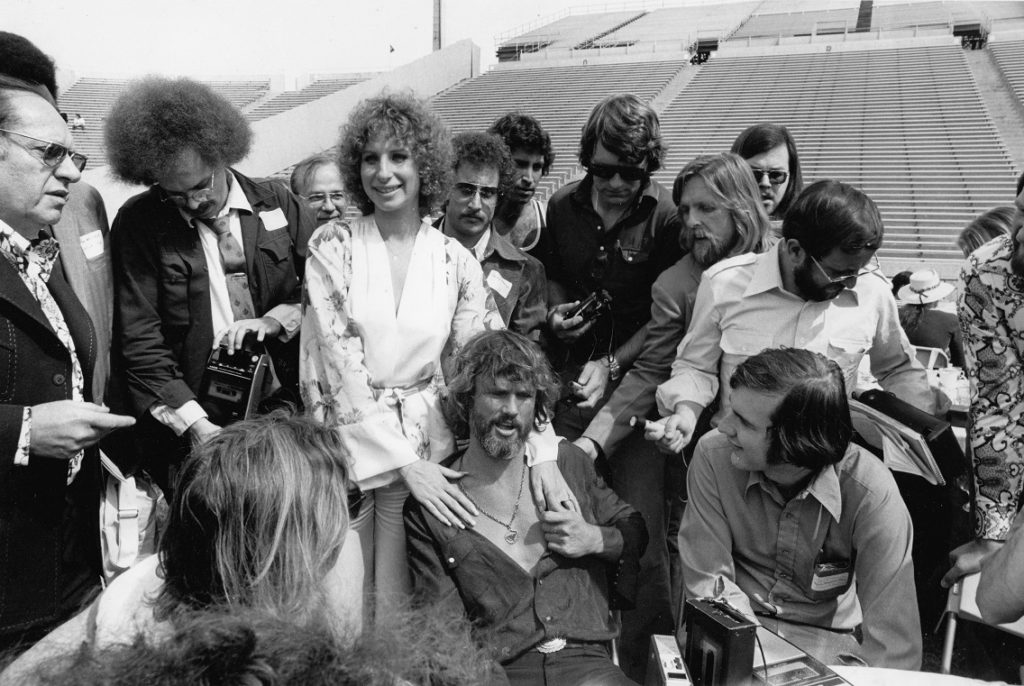
ME DURING MY INTERVIEWER DAYS FIDDLING WITH THE RECORDER. OBVIOUSLY I NEEDED A GOOD HAIR STYLIST
When the opportunity arose to write for a local entertainment newspaper, I wrote the same way. So, within two years after leaving college I was writing for an independent weekly newspaper with the third largest readership in the city. In a matter of months I became the best interviewer in town and when finally promoted to editor produced a paper so original that every single journalism student who walked into my office made it a point to tell me how much they detested it. Whenever I heard this I was in bliss because I knew that I was doing something new and original. In the process of writing scripts and writing and editing newspaper work, I had become a workaholic with very little time for anything but work.
So, of course my first marriage collapsed and, me, pretty much with it. To get my balance again, I returned to New York and worked for a small independent film company to pay the rent by turning out publicity releases. I detested the work and detested the job because it had me seeing movies exclusively as an industry where I was part of the operation which promoted and sold its wares. Don’t get me wrong, there are some people who love this kind of work. I simply wasn’t one of them. Soon after that, because of my editing skills learned from both collage and at the newspaper, I finagled a job as a video editor doing music videos and he like. Editing is editing, and if anyone tell you different they don’t know what they are talking about. That wasn’t for me either because, as a video editor, I was basically a tool used by someone else so they could be creative. That just wasn't my cup of tea.
Eventfully I left that and did film research which I loved and was extremely good at because it was all about uncovering and discovering as I learned in depth about what I was researching. In a certain way, it was like being in the stacks of that college library again where I was learning for the pure joy of learning. After that I was hired by a college to work with students so I might put together a college literary magazines and then, eventually, I organized the best of that work into an anthology.
In the process though I began writing prose; first memoirist writingand then—and it was a struggle—books. It wasn’t long before I realized this was what I was meant to do and where, what seemed to be a directionless journey, had actually taken me. Truly, it was, for me my “I was blind and now I can see” epiphany.

The calendar pages fly past. Today, since I am an extremely private person—I live in the middle of the woods—and write in the isolation of my office cabin above. The first book of mine in print, “The Purple Diaries” is really my 11th book but the first I decided to have published. Possessing the resources that allowed me the freedom not to publish, instead, I let the writing take its course without any interference from book sales, critics, editors and the like. So, having found my voice or style, discovered what I really wanted to write about as well as achieved the ability to convey my ‘vision’ (as pompous as that may sound) clearly and concisely, I felt ready to face the public, the critics and editors..
Living on the side of a mountain with a ten foot high fence that surrounds my four wooded acres I live a lifestyle that allows me the privacy and seclusion that permits me to write without any unnecessary distractions such as in interacting with other human beings. I think that’s called being a recluse. Therefore, because I live an isolated life of a writer; spending 90 percent of my time either writing, preparing to write, resting after writing or getting ready to repeat the process all over again the following day, a real social life—family get-togethers, parties, card night with friends, etc.—are cumbersome affairs that interfere with, for me, a very solitary process.
The isolated life I live does have its disadvantages. A number of years ago my youngest stepdaughter—who was 16 at the time—and I were in the midst of a heated argument brought on by her considerable adolescent angst. She told me flat out that she was completely disgusted with my life choices and that I needed “to get a life.” In reply I merely shrugged and—sarcastically of course—apologized for being such an abject failure. But, to myself I thought, “You know, she’s got a point there.” In an effort to concentrate on my writing, I had basically withdrawn into a very private world up here in the woods where my social interaction was extremely limited. Thus, to a normal 16 year old girl, seeing someone without an extensive social life, unable or unwilling to spend 24/7 on the phone—land or cell—with their friends, it became obvious that he—or me—didn’t have anything even approaching a life. In short, since a social life was her life, it was pretty clear to me why she would see that I didn’t have a life. Fortunately being older, I just didn't have the same priorities as she did.
Nevertheless, I believe—and this is a prime example of writer vanity—that I have an extremely rich interior life filled with a great deal of self-reflection which is the meat of any decent writer. It is this interior life that informs what I write and, more importantly, helps create writing that people might find interesting and will want to read.
This withdrawal from ‘life’ does have its advantages and this is the joy of a writer’s life and living like a hermit. During my writing ‘down time’ I watch three or four movies a day. Among other things this has allowed me to study movies as I had never been able to do before. Now, and at will, I have the time to watch a movie over and over to a degree that I was unable to do before transporting myself to upstate New York and choosing to live as a semi-recluse. Prior to this, because of all the activity in my life—social and otherwise—movies were something next to me—a sort of friend. Now, along with my writing they are front and center. For me, I’m like an art historian locked away in The Louvre 24/7. Frankly, if there is anything better that that, I just don’t know. I can now watch some films twenty times or more. Even though my wife chides me repeating about herself, “I can see twice, maybe, for the better ones. But 20 times, no way,” that still doesn’t stop me. In the case of GONE WITH THE WIND the number is closer to 100 and still counting.
So, for that movie buff that you read about above, my life now is nothing less than a dream come true. And then on top of that I can write all I want. I simply couldn’t ask for anything better.